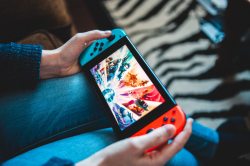Half of the U.S. and Russian Populations Play Video Games
According to a report by Newzoo, 50 percent of Americans play video games. 71.3 million Russians enjoy various forms of video games, which is nearly half the country's population as well. We often hear about the negative effects of video gaming, but not everything we hear is true. ITMO.NEWS has already published an article about the current research on the topic and it turned out that there is no direct correlation between video games and violence. On the contrary, video games can improve one's concentration and attention and have a better effect on academic performance than spending time on social media.
The most important thing to remember when playing video games is that everything is good in moderation. If you spend day and night in front of a computer, you won’t achieve success in real life. But if playing video games is just a hobby for you, it can help you to acquire many soft skills, says Miroslava Valkevich.

System Analysis
What do you do when playing a new game? First, you explore the interface, the units, the map and the characters’ capabilities. Then you have to build an effective strategy to win the game while scoring as many bonuses as possible.
“That is exactly what system analysis is about, say John C. Beck and Mitchell Wade, the authors of the book “Got Game: How the Gamer Generation is Reshaping Business Forever”. In their book they state that playing video games can boost learning”, added Miroslava.
In this book written in 2004, Harvard graduates John C. Beck and Mitchell Wade offer an at-the-time contrarian view of video games and claim that the “gamer generation” will make for very different kinds of employees and managers.

Resilience and Determination
“Gamers instinctively want to move forward. When you play video games, you acquire certain behavior patterns useful in real life. Gamers know that failure is survivable, because they have already failed thousands of times and they are not afraid to start over”, shared Miroslava Valkevich.
Indeed, researchers from Texas Tech University found out that playing video games can mitigate the pain of failure and help to remain positive. However, it is not that simple. The research suggests that those who value success in video games are more willing to accept failure in real life and move on. Conversely, those who do not value success in video games, do not value success in real life either and are more likely to engage in self-protective behaviors.
Scientists from the University of Rochester have confirmed that playing action video games improves not just the skills taught in the game, but learning capabilities in general. Individuals with little video game experience were recruited, and as part of the experiment, were asked to play video games for 50 hours over the course of nine weeks. One group played action video games, such as Call of Duty. The second group played 50 hours of non-action video games, such as The Sims. Then the trainees were asked to perform a special task to assess their learning capabilities. The test showed that those who played action video games improved their learning capabilities.

In an interview with Harvard Business School, John C. Beck and Mitchell Wade said that gamers tend to be more resilient and quick-thinking.
Teamwork and Leadership Skills
The authors of “Got Game: How the Gamer Generation is Reshaping Business Forever” also believe that even though they might be seen as loners, gamers often make excellent leaders and team players.
“Any gamer knows that the outcome of any game depends not only on their personal performance, but also how they perform in a team. All the players must work together in order to win. If you want to lead a team, you have to explain your point of view to a group of strangers. So you can acquire great leadership skills”, explained Miroslava Valkevich. Role-playing games such as World of Warcraft are especially efficient, added Ms. Valkevich.
This is confirmed by other research. A new study by researchers at Missouri S&T found that World of Warcraft (WoW) can actually get you a job. The researchers surveyed 288 WoW gamers who played WoW eight hours a week and worked 38 hours a week. The survey consisted of 140 questions asking about motivation, communication skills, preferences for teamwork, and personality, with most questions relating to the Big Five personality traits: extraversion, agreeableness, openness, conscientiousness and neuroticism. Then the researchers compared the players’ survey answers to their characters’ in-game stats. They wanted to find out what kind of characteristics a person had in-game that would translate to real life and the workplace.

The correlations between the respondents' gaming skills and real-life behavior turned out to be small, but significant. One of the strongest correlations the researchers found was in terms of technology readiness. One explanation for this is that gamers are always improving their skills and stats, thus exposing themselves to constant changes.
“If you're applying to a tech company, don’t hesitate to write in your résumé about your favorite video games and your achievements. Especially if it is a video game company”, noted the lecturer.
Training for Real Life Situations
When playing video games, you can train for various real life situations and develop necessary soft skills. Researchers at the City University of New York focused on how students’ motivation to learn, as well as their interest and performance in math, was affected by playing a math video game and they found out that playing educational video games can enhance students’ motivation to learn.
Imagine you are at an airport, waiting for a flight. And then your boss calls and says the company needs a new strategy. He wants you to come up with several options. You try to find as much information as possible among passengers and employees of the airport. This is the premise for a new video game called “One Day,” developed to teach strategy to MBA students.

“Video games can help students to develop certain skills that are also useful in real life”, commented Miroslava Valkevich.




